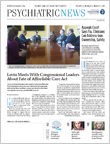The U.S. Court of Appeals for the 11th Circuit last month upheld a lower federal court ruling against provisions of Florida’s Firearms Owners Privacy Act, the law that sought to restrict discussions by physicians and other medical professionals about firearm ownership.
The 2011 law included penalties of up to $10,000 and loss of medical license for physicians who routinely asked patients and their families about firearms. The American Academy of Pediatrics (AAP) and the AMA have supported a role for physicians to ask patients if there were firearms in the home and, if so, to advise them about ways to safely store guns.
The Florida chapter of the AAP, other medical groups, and six individual physicians challenged the law as a violation of the First Amendment right to free speech.
“We are pleased with the 11th Circuit’s common-sense decision, which allows physicians the right to counsel families on firearms ownership and storage,” said Madeline Joseph, M.D., president of the Florida chapter of the AAP, in a statement following the decision.
APA joined with the AMA and numerous other medical groups in an amicus brief supporting the pediatricians. They stated that discussion of gun safety is a legitimate public health concern and that the law violated the First Amendment rights of physicians and patients.
Quoting an earlier U.S. Supreme Court decision, the court noted that in “the fields of medicine and public health . . . information can save lives.”
The chair of APA’s Committee on Judicial Action agreed.
“This long-awaited ruling from the Florida appeals court defends the free speech physicians must exercise to appropriately care for their patients and preserves the privacy of the physician-patient relationship without the unwarranted intrusion of a political agenda,” said Marvin Swartz, M.D., a professor of psychiatry and behavioral sciences at Duke University. “Careful history-taking about firearm access is the cornerstone of risk assessment in vulnerable patients.”
“We have always felt that the government should not dictate what doctors can say to patients,” added Gregory Fritz, M.D., president of the American Academy of Child and Adolescent Psychiatry, in an interview. “With a suicidal patient, it would be malpractice not to assess access to lethal weapons.”
The court noted that the Florida legislature had developed the law based solely on six anecdotal complaints and no other evidence.
“There is no claim, much less any evidence, that routine questions to patients about the ownership of firearms are medically inappropriate, ethically problematic, or practically ineffective,” wrote the judges in their opinion. “Nor is there any contention (or, again, any evidence) that blanket questioning on the topic of firearm ownership is leading to bad, unsound, or dangerous medical advice.”
It is uncertain now whether the case will be further appealed to the U.S. Supreme Court or whether legislators will rewrite the law in the light of the court’s decision. ■
The 11th Circuit Court’s decision can be accessed
here.
